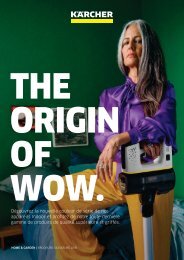difference 01/2017 - The Kärcher Magazine
- Bible study and sequoias - Vision smart cleaning - And what type are you?
- Bible study and sequoias
- Vision smart cleaning
- And what type are you?
You also want an ePaper? Increase the reach of your titles
YUMPU automatically turns print PDFs into web optimized ePapers that Google loves.
Clean Water<br />
for the World<br />
This is the name of the initiative that <strong>Kärcher</strong> launched in<br />
cooperation with the Global Nature Fund in 2<strong>01</strong>2.<br />
Felipe Valderrama with<br />
the core of the green<br />
filter systems in Columbia:<br />
a water hyacinth,<br />
which is indigenous to<br />
the tropics of South<br />
America.<br />
<strong>The</strong> aim is to build green filter<br />
systems for ecological water<br />
treatment in developing and<br />
emerging countries. This “green<br />
technology” uses the roots of the<br />
water hyacinth, for example, in shallow<br />
and narrow channels to filter harmful<br />
substances and pathogens out of the<br />
waste water in village communities.<br />
<strong>The</strong>re are now seven installations in<br />
operation in Colombia, Mexico, South<br />
Africa and the Philippines, benefitting<br />
more than 360,000 people – and the<br />
next projects are already being planned.<br />
<strong>The</strong> Colombian Felipe Valderrama<br />
works for the non-governmental organisation<br />
Fundación Humedales and is<br />
supporting the implementation as project<br />
manager.<br />
What motivated you to get involved<br />
with the green filter initiative?<br />
I grew up in a developing country and<br />
soon became aware of the problems<br />
caused by a lack of money and technology.<br />
Many people are resigned to<br />
this situation, as they often do not<br />
know what simple and cost-effective<br />
methods exist to resolve numerous<br />
problems.<br />
My motivation therefore is to act as a<br />
facilitator of simple solutions that also<br />
work in regions where there are low<br />
levels of education and a lack of funding.<br />
<strong>The</strong> green filter systems are a perfect<br />
example. <strong>The</strong>y are able to achieve<br />
good and lasting results – without<br />
great effort.<br />
What are the main advantages of<br />
green filter systems?<br />
<strong>The</strong> main strengths of the systems<br />
are their simple realisation and easy<br />
operation. This makes them an ideal<br />
solution for the treatment of waste<br />
water in small villages.<br />
<strong>The</strong>y are designed according to the<br />
principle of bionics. This means that<br />
the system intensifies spontaneous<br />
biological processes as they occur in<br />
natural wetlands. In the process, the<br />
organic mass is decomposed, which<br />
increases the water quality. Since this<br />
is a natural process, there is little for<br />
people to do.<br />
What role does <strong>Kärcher</strong> play?<br />
With the “Clean Water for the World”<br />
initiative in cooperation with the<br />
Global Nature Fund, <strong>Kärcher</strong> has made<br />
it possible for numerous small organisations<br />
to realise local water pollution<br />
control projects. Our organisation<br />
Fundación Humedales is supported in<br />
Colombia. <strong>The</strong> project in San Miguel<br />
de Sema gave us the opportunity to<br />
test and further develop our idea for<br />
the first time on a real scale. ▪<br />
More about the function of green<br />
filter systems and the initiative with<br />
the Global Nature Fund:<br />
www.kaercher.com/<strong>difference</strong>

















